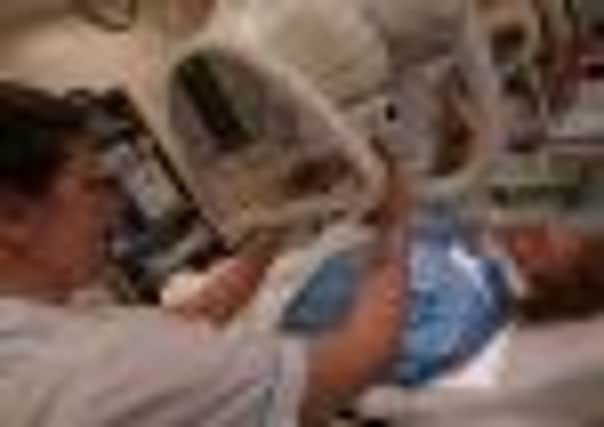Euan McColm: Waiting time targets will result in a grim prognosis for the NHS


Not only that, but we’re going to lose eight pounds, learn conversational Spanish and find a new partner who ticks several boxes. That’ll show them. Targets give life structure; their achievement creates the illusion of substance.
So it’s no surprise that targets are so popular with politicians. They’re a simple way of illustrating progress. Targets are easily understood by voters and they usefully distract from more complex discussion about the failings of whatever service it is to which they’ve been applied. It is far easier to promise smaller class sizes, for example, than to address issues around why boys in primaries six and seven are at increased risk of going off the rails.
Advertisement
Hide AdAdvertisement
Hide AdTargets really come into their own when politicians discuss the NHS. Debate over the service seems reduced at times over which party will get your tonsils out quicker. We talk less about the quality of care than about waiting times.
But the problem with targets is that sometimes they’re not (or cannot be) met, as Deputy First Minister Nicola Sturgeon – and the rest of us – were reminded this week. An Audit Scotland report raised serious questions about the way hospital waiting lists were being administered. Inspectors – who had already identified deliberate manipulation of lists in NHS Lothian last year – discovered nationwide irregularities in the numbers of patients recorded as having missed appointments because of “social unavailability”.
With targets stating that patients must receive treatment within 18 weeks of seeing a GP – and within 12 weeks of agreeing a treatment programme – these missed appointments helped health boards appease politicians who, in turn, appeased the rest of us. Look! We’ve hit our targets. Everything’s hunky dory.
A frustrating lack of proper records means we’ll never know to what extent “social unavailability” (a patient’s unavailability because of holidays or other engagements) was used to tweak figures, but we do know there’s a prima facie case that figures were deliberately distorted during Sturgeon’s time as health secretary.
There’s no suggestion that the Deputy First Minister was personally complicit in this manipulation but, from an opposition point of view, that’s not important. It’s legitimate to ask questions about how much scrutiny Sturgeon gave to the waiting times success stories she proudly related while health secretary, and which contributed to her reputation as a politician of efficiency and integrity.
Friends of Sturgeon insist she could not have known this scam was taking place and that she’s perfectly prepared for opposition attacks. The Deputy First Minister is a substantial target for opponents. She’s become an electoral asset to the SNP, recently achieving an approval rating that outstripped the Better Together campaign’s Alistair Darling (and First Minister Alex Salmond’s, too).
With Sturgeon now at the forefront of the Yes campaign (priority mission: woo the Middle Scots turned off by brash Salmond), it’s inevitable that opposition politicians will continue to try to damage her with the suggestion she’s personally responsible for the waiting times scams uncovered by Audit Scotland.
I wonder if those opponents might be wise to take a deep breath. Sturgeon is a legitimate political target, but it’s going to be a push to make stick the idea that she should take personal blame for this scandal. That’s not to say opponents should walk away. Wiser heads in the Labour Party see Sturgeon’s vulnerability not in her management of the NHS but in the lack of reform of the service during her five years in charge.
Advertisement
Hide AdAdvertisement
Hide AdGiving the Deputy First Minister a hard time about this might cause her brief inconvenience, some irritation, even. But a forensic examination of her running of the health service, completely absent during most of Sturgeon’s spell as Health Secretary, might be more fruitful. That’s a matter for the opposition though. If they can get their act together to go after Sturgeon, they should. Of course they should. She’s nothing but trouble for Better Together, what with her ability to connect with voters who don’t identify themselves as nationalists. Sturgeon won’t be damaged by a spat over the use of the term “social unavailability” to massage waiting times, but she may be if her time at health saw her put managing of targets and lists before fundamental improvements to the service.
Current health secretary Alex Neil –though a far from significant figure in the Yes campaign – appears to have carried on with Sturgeon’s managerial reform. The accusation that the SNP has failed to challenge conventions in the NHS remains valid and opponents should pursue that line.
Promises about waiting times – or class sizes, or council tax freezes – are made without real thought to the practicalities or consequences. We lap it up, as if meeting this or that target is somehow proof of the greater good health of our NHS. But, privately, MSPs of all parties know the drive to offer shorter waiting times has gone as far as it can. The pressure they place on hospital staff to deliver on promises made in election manifestos leads to corner-cutting and fact-fudging.
Waiting time guarantees are simple and easy to understand, but are they really what we need? Obviously, for illnesses such as cancer, time is of the essence, but do we expect the undeliverable when it comes to treatment of more minor conditions? Waiting time promises may make sense politically, but medically? You won’t necessarily be happier when you lose eight pounds and meet that box-ticking new partner. But nor will the NHS improve on the basis that a few vote-grabbing – but ill-considered – promises must be met. «
Twitter: @euanmccolm